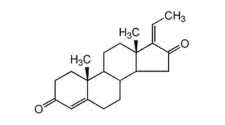Z-Guggulsterone Supplement - A Lipid Modifier and Metabolic Enhancer

Understanding all Available Supplements and Their Benefits is Key
Guggulsterone - the word doesn't exactly roll off your tongue. If you say it fast enough, someone could think you're talking about gallstones. But guggolsterone is a type of ketosteroid isolated from the resin from Commiphora mukul a plant native to the amid regions of Rajasthan and Gujarat, which are states in India. In the ancient style of Indian medicine (Ayurveda), it goes by the name guggulu. Curiously, guggulu may have properties beneficial to high-performance athletes. That is, of course, if you're interested in having healthy cholesterol levels and increasing your metabolism.
Under the Microscope
Clearly, if you can elevate your metabolism, you could expect to have less bodyfat - even while sitting on your butt. So let me tell you how guggulu seems to work. Research would indicate that guggulu can stimulate your thyroid gland directly or indirectly via the pituitary. The two main thyroid hormones are thyroxine (T4) and tri-iodothyronine (T3). Under normal conditions, most of the activity of T4 can be accounted for by its conversion to T3; thus some consider T4 a prohormone. The thyroid hormones affect nearly all of your body's tissues and, in normal amounts, affect growth and development. Also, thyroid hormone stimulates basal metabolic rate, or the rate at which your body burns calories. But in excess, it can cause nervousness, irritability, emotional instability and heat intolerance.So where does guggulu fit in? Very little research has been done, but some conducted in India demonstrated that taking 4.5 mg per pound of bodyweight per day of (Z)-guggulsterone for six days can lessen the decrease in T3. In rats with deficient thyroid activity, guggulu treatment resulted in 62% higher levels of serum thyroxine than in untreated rats. Furthermore, thyroid-deficient rats treated with guggulu had higher serum thyroxine levels than normal hut untreated rats (no thyroid problems).
Of course, humans aren't rats and most of us don't suffer from hypothyroidism. But guggulu has possibilities beyond metabolic enhancement. One study from India associates guggulu with certain anti-inflammatory effects. One study might not mean much to the scientific community but it can be meaningful if for nothing else than resulting in more research to support or refute the original findings. In this case, I feel we need to consider the potential of this study so that you can make up your own minds.
More recent studies indicate guggulu's beneficial role for blood lipid levels. For instance, chronic feeding of rats with guggulu produced a decrease in serum cholesterol levels. In patients with kidney disease who received guggulu orally (75 mg a day for eight weeks), total cholesterol decreased while HDL-cholesterol levels showed a trend toward an increase. In a multi-center clinical trial conducted in various cities in India, 205 patients consumed 1,500 mg (500 mg three times per day) of guggulu for a period of eight weeks) Subjects experienced a 6%-27% decrease in serum cholesterol and a 10%-31% decrease in serum triglycerides: Guggulu demonstrated effects on blood lipids similar to and at times better than the lipid- lowering drug Clofibrate.
Guggula Bodybuilders
How can guggulsterone help bodybuilders? Perhaps the best time to use it would be during a weight-reduction cycle. Let's say you're trying to get in contest shape or just want to lose weight. What's your No. 1 concern? You don't want to lose muscle mass and lower your metabolic rate while you lose fat. Since guggulsterone seems to elevate levels of thyroid hormone, and since we know that dieting can lower your metabolic rate secondary to a drop in thyroid hormone, guggulu may be able to effectively moderate these changes.Certainly, this could have important implications for body composition, helping you lose more bodyfat. But another benefit could be that this stuff seems to have a lipid-lowering effect. And although we certainly need more research to confirm original findings, guggulsterone may have anti-inflammatory properties as well.
Until new research results come in, the evidence seems promising.
Clip Notes on Gugguisterone
Composition: A ketosteroid [4,17(20)-trans-pregriandi-ene-3,16-dione], specifically called (Z)-guggulsterone.Availability: In the United States, the only product we're aware of at present that contains guggulsterone is Metabolic Thyroline (brand name). It contains guggulsterone as one ingredient out of many.
Characteristics: Lipid-lowering agent, thyroid-stimulating, anti-inflammatory.
Potential Benefits: Improve blood-lipid profiles for better cardiovascular health; boost metabolic rate, which may result in greater bodyfat losses; improve recovery of damaged tissue.
Commonly Used Dose: 500 mg, three times per day.
Research Synopsis: Z-guggulsterone has been shown in animals to increase metabolic rate via a stimulatory effect on the thyroid gland. Human studies have demonstrated lipid-lowering effects [decreases blood cholesterol and triglycerides). There are no known adverse effects on hematological and biochemical parameters and electrocardiograms.